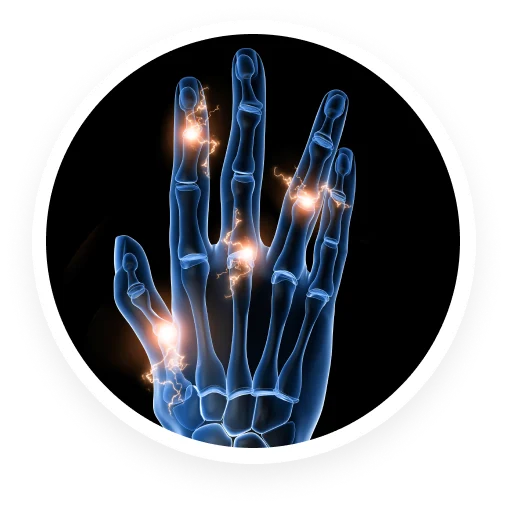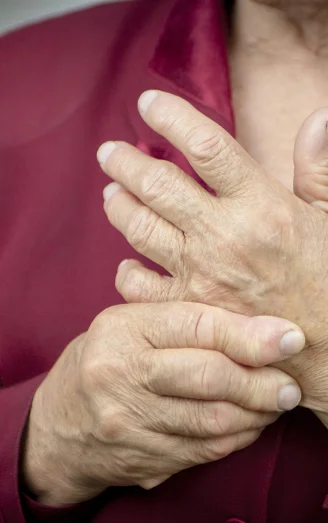
Arthritis
Many people suffer from the joint pain and discomfort that arthritis brings.
Allen Finney
Review
Young ladies behind the counter were nice and professional. Dr. Khan was and is awesome. You felt he really cared which I have not felt in the 2 years I've been injured. Only reason I did not give it 5 stars was the hard time I had finding it.
Allen Finney
Review
Young ladies behind the counter were nice and professional. Dr. Khan was and is awesome. You felt he really cared which I have not felt in the 2 years I've been injured. Only reason I did not give it 5 stars was the hard time I had finding it.
charles griffin
Review
Have been doing a wonderful job with help with my nerve pain, listen to me, and my request no to be put on pain killers but to help find the problem, always return calls so glad is was referred to them.
Stacey Mejia
Review
Awesome staff Dr. Kahn is a really good Doctor he listens and is a helping man!! I appreciate all of your guys work you do for your patients!! You even call to give reminder the day before your appointment! Again that's so awesome!!
Forrest Hammer
Review
NOTHING BUT THE BEST. ABLE TO WALK. ABLE TO PERFORM TASKS THAT I COULDN'T FOR A LONG TIME, LIKE DAILY WALKING, BENDING OVER, CARRYING GROCERIES AND ENJOYING A MOVIE AT THE CINEMA. THANK YOU DR. ASIM KAHN.
Jeanne Neathery
Review
Dr RYklin is amazing. He treats each patient as if you’re his only one. I’ve been seeing him for 7yrs due to a neck injury. He definitely finds what pain management meets your individual needs. The practitioners are amazing as well!!!!
Marty Klopper
Review
Pain Dr office. Staff is friendly and professional. Lots of paper work to be filled out. Office was clean and neat. Masks on Staff at all times and required for patients to enter. Will be going back for follow-up appointments.
Kim LindL
Review
The staff is very pleasant and Dr. Khan is very good with a needle I've been getting epidurals and shots in my foot and lower back for about 4 years now, he is very good and I would never go to another place
Angel Bussert
Review
The doctor actually listens. I have been a patient for years and love the staff and doctors. I've been to all the locations the country club one is always super busy queen creek location is never packed so I go there.
Guy Romero Jr
Review
Every Staff personnel are very professional, courteous and patient respectful in caring for each medical problem. We live out in Laveen, but finding good patient care are hard to find, Truly Blessed Guy E Romero
John Crosby
Review
They do a great job in today's challenging health care system. Great Nurse Practitioners who work hard. Great support staff. Doctors are expert practitioners. Stable practice. I have over five years personal experience with them.
Stacey Mejia
Review
Awesome staff Dr. Kahn is a really good Doctor he listens and is a helping man!! I appreciate all of your guys work you do for your patients!! You even call to give reminder the day before your appointment! Again that's so awesome!!
Kim LindL
Review
The staff is very pleasant and Dr. Khan is very good with a needle I've been getting epidurals and shots in my foot and lower back for about 4 years now, he is very good and I would never go to another place
Guy Romero Jr
Review
Every Staff personnel are very professional, courteous and patient respectful in caring for each medical problem. We live out in Laveen, but finding good patient care are hard to find, Truly Blessed Guy E Romero
Angel Bussert
Review
The doctor actually listens. I have been a patient for years and love the staff and doctors. I've been to all the locations the country club one is always super busy queen creek location is never packed so I go there.
Forrest Hammer
Review
NOTHING BUT THE BEST. ABLE TO WALK. ABLE TO PERFORM TASKS THAT I COULDN'T FOR A LONG TIME, LIKE DAILY WALKING, BENDING OVER, CARRYING GROCERIES AND ENJOYING A MOVIE AT THE CINEMA. THANK YOU DR. ASIM KAHN.
Jeanne Neathery
Review
Dr RYklin is amazing. He treats each patient as if you’re his only one. I’ve been seeing him for 7yrs due to a neck injury. He definitely finds what pain management meets your individual needs. The practitioners are amazing as well!!!!
Marty Klopper
Review
Pain Dr office. Staff is friendly and professional. Lots of paper work to be filled out. Office was clean and neat. Masks on Staff at all times and required for patients to enter. Will be going back for follow-up appointments.
John Crosby
Review
They do a great job in today's challenging health care system. Great Nurse Practitioners who work hard. Great support staff. Doctors are expert practitioners. Stable practice. I have over five years personal experience with them.
Carol Gravatt Davidson
Review
Absolutely the best place I have been too...so many doctors and always just prescribed pain pills for over 10 years. There is hope, after starting injections I feel so much better. I know I'm in the right place.
Tim Tuzon
Review
Been with Kahn for over a year and wouldn't want to be anywhere else. He is not a pharmacy! He solves the issues instead of hiding them with tons of drugs. Have had multiple procedures to correct the problems.
Brooke Keifer
Review
I was nervous when I brought my mom into the office. They are clearly a very busy office, but the front staff was kind, and the doctor was very confident in a treatment plan. Overall my Mom was very pleased with her visit.
Kari Lynn Plo
Review
I love Dr Ryklin and his assistant Liza! They've always been super good to me and very sympathetic to all my needs! They've done everything they can to make me comfortable and to help me with my pain! I'd refer anyone to them!
Lacey Smithson
Review
This office keeps getting better every time I go. Staff is friendly, doctors are very well educated and good at what they do. And they have helped decrease my mom's back pain by 80%! Everyone with pain should go to this place!
Katty Miller
Review
Dr. Khan is truly carrying, understanding and the VERY BEST AT ADMINISTRATING SGB INJECTIONS!!! I look forward to driving from California to be seen by him. I just can't say enough. Thank you Dr. Khan.
Britt Montoya
Review
Great place. Dr Khan is an awesome Dr and goes above and beyond to help you. Meghan is a wonderful P.A. as well. It says so much to have a Dr that truly cares about your outcome of your procedures. This is a goodhearted Dr
Julie Kierzek (Julz)
Review
Love them all. Dr Ryklin is so helpful and understanding. He takes helping people seriously & I'm extremely grateful for everything he & the PA's & MA's have done for me. Dr Ryklin has gone above & beyond for me.
Delicia N
Review
The team here are genuinely the most helpful providers I have ever had. I went through my worst lupus flare ever last year and mentally did not think I would make it. They truly saved me and made me feel like I could ask for help!
Caroline Copeland
Review
We are Dr. Ryklin's patients. He is an amazing pain management physician. All of the treatments that we receive work extraordinarily well. His entire staff, from front to back, are exceptional. Patient care is really the specialty here.
Eva Linda Hemmerling
Review
I'm a patient Dr. Khan/ NP Liza. I find Doc Liza caring always interested in me as a whole. Body/Mind/soul. Find comfort in her. Staff Dustin,Amanda are tops also. I highly recommend AZ Spine Institute. E.L.H.
Charles Eberhardt
Review
I have been to the Vineyard location 12 times and this is the best Doctor's office I have ever been to. The staff is by far the friendliest and most caring staff around. I actually look forward to my visits. Thanks for everything.
Becky Kirby
Review
For the last 12 years, Arizona pain and spine in Queen Creek with Lisa, has taken care of my pain issues. Without her, I wouldn't be able to manage the excruciating pain I have had after my time in the service

What is arthritis?
Arthritis is the swelling and inflammation of joints. While there are hundreds of types of arthritis, the two most common forms are osteoarthritis and rheumatoid arthritis. Each type of arthritis damages joints in different ways. In some cases, arthritis will affect the surrounding tissue of a damaged joint as well.
Osteoarthritis is the most common type of arthritis and is due to wear and tear. It most commonly occurs in the knees, spine, hips, and hands but can be present in other joints in the body as well. When joint cartilage breaks down, osteoarthritis occurs.
Rheumatoid arthritis is an autoimmune disease that causes inflammation in the affected joints. This occurs when your body’s immune system misidentifies your healthy cells and attacks them as if they are foreign invaders, such as harmful viruses or bacteria. Rheumatoid arthritis can attack many joints at once and is most common in women.
At Arizona Pain and Spine Institute, we treat arthritis that impacts many areas of the body. Some of our most common treatments include pain management for:
- Hip Arthritis
- Knee Arthritis
- Shoulder Arthritis
You can read more about your specific condition and our available treatments on the pages above.
What are the symptoms of arthritis?
The most common symptoms of arthritis are:
- Pain
- Swelling
- Stiffness
- Redness
- Decreased range of motion
- Joint changes
- Warmth
- Fatigue
- Loss of appetite
- Tenderness
In severe cases, arthritis pain can make it impossible for sufferers to walk, go up and down stairs and result in the inability to perform daily activities such as cleaning, bathing, brushing their teeth, gardening, and more. People with arthritis may even abstain from social events due to their pain and discomfort.
What causes arthritis?
Autoimmune Diseases
Some types of arthritis are classified as autoimmune diseases, such as rheumatoid arthritis, lupus, ankylosing spondylitis, and others. Many inflammatory arthritis conditions are caused by the body’s immune system turning on itself. Genetics play a role in who will develop an autoimmune disease but many other factors influence these diseases as well.
Inheritance
People born with specific genes are more likely to develop inflammatory types of arthritis. HLA genes put people at a higher risk of rheumatoid arthritis, ankylosing spondylitis, and lupus. The reason why is unknown.
Osteoporosis is also considered an inherited disease. If you have family members with OA, you’re more likely to develop it. Fibromyalgia is linked to genetics as well.
Infection
Certain infections can lead to arthritis. Lyme disease, staph, hepatitis, mumps, and joint infections can all cause arthritis, the most common infectious cause being staph. This type of arthritis is reactive, meaning an infection somewhere in the body causes inflammation in the joints.
Injury
Injuries that cause joint damage can lead to arthritis. Joints can be damaged while playing sports or in a car accident. Traumatic damage weakens the affected bone or cartilage causing it to break down, leading to arthritis.
How is arthritis treated?
While arthritis can be a debilitating disease, there are treatment options available that can ease pain and discomfort. Once a patient has received a diagnosis, we create an individualized treatment plan to best serve their needs. When beginning treatment, remember that all bodies respond differently, so you may have to try several options before finding what works best for you. As with many medical conditions, the earlier a patient receives treatment, the better. The following are common treatment options your doctor may recommend.
Medication
Depending on the diagnosis, medication can be a great option for reducing pain and managing inflammation. NSAIDS (anti-inflammatories), painkillers such as acetaminophen, tramadol, and oxycodone, oral or injected corticosteroids, and disease-modifying anti-rheumatic drugs for rheumatoid arthritis are just a few medications used to combat arthritis. Those with infectious arthritis may require antibiotics.
Occupational & Physical Therapy
Both occupational therapy and physical therapy can benefit patients with arthritis. Physical therapy programs are designed with strength and mobility in mind. Occupational therapy is primarily used to teach patients how to complete daily activities that have become difficult and how to adapt so that their quality of life does not suffer.
Surgery
While surgery is the least conservative treatment option, for some patients it is necessary. Surgery can be used to replace, resurface and repair any joints that are damaged. There are many types of surgery used to combat and repair damage due to arthritis but some of the most common are joint replacements, synovectomies, arthroscopies, joint resurfacing procedures, and joint fusions.
Joint replacement procedures are most commonly performed on the knees and hips and involve a total replacement of damaged joints. A synovectomy is the removal of damaged synovium and is typically performed on people with rheumatoid arthritis. Joint fusions use hardware to fuse multiple bones together. Arthroscopic procedures aim to repair damaged tissue and cartilage and can sometimes eliminate the need for a total joint replacement. Joint resurfacing involves placing an implant to create a smooth surface with the intention of reducing pain and increasing the patient’s range of motion.
Home Remedies
Arthritis can be relieved at home through hot & cold packs and lifestyle changes. It is important for anyone suffering from arthritis to consider the following lifestyle changes.
- Exercise regularly.
- Eat a healthy diet.
- Maintain a healthy weight.
- Get plenty of rest.
Heat can be used to help relax muscles, spasms and relieve stiffness. Cold packs can reduce swelling, pain, and calm inflammation as well.
AZ Pain and Spine Institute
Arthritis Treatments
Here at Arizona Pain and Spine Institute, we improve our patients’ quality of life by alleviating and managing their pain. Some of our Arthritis treatments include:

Why choose AZ Pain and Spine Institute to treat your Arthritis?
We have a team of medical practitioners, pain management doctors, and staff who are experts on pain management, including Arthritis. We use state-of-the-art technology and effective approaches in achieving our mission. We care about your well-being and are committed to making your life pain-free.
